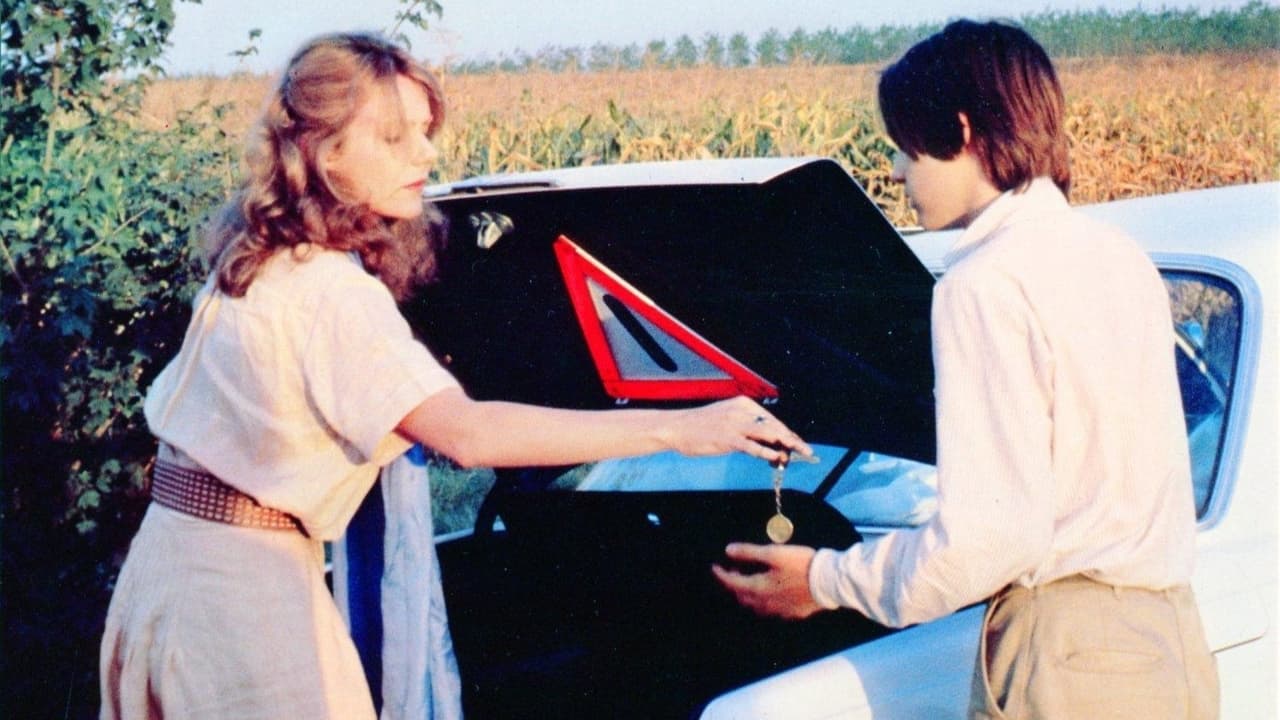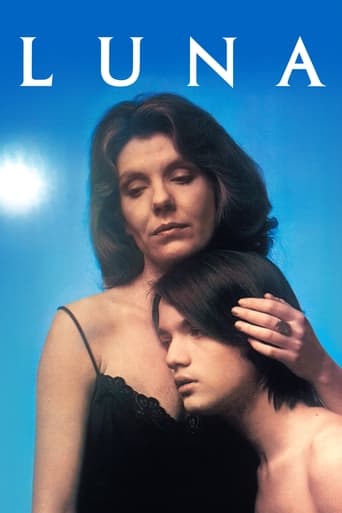

It's fun, it's light, [but] it has a hard time when its tries to get heavy.
... View MoreIt really made me laugh, but for some moments I was tearing up because I could relate so much.
... View MoreIt is interesting even when nothing much happens, which is for most of its 3-hour running time. Read full review
... View MoreThere's a more than satisfactory amount of boom-boom in the movie's trim running time.
... View MoreOpera singer Caterina Silveri's (Jill Clayburgh) husband dies in a car accident. She moves to Italy with her 15 year old son Joe (played by 17 year old Matthew Barry) to revive her career. She, not on purpose, begins to neglect Joe and he starts shooting up heroin. She finds out and doesn't know what to do. She ends up sleeping with him to get him off drugs! There's a LOT more to it than that but I wouldn't want to ruin it for anyone.First off--the incest. It's hardly in the movie at all. It's not even the main plot--it's a sub plot! There are only two scenes and neither of them contain nudity or are explicit. Also Clayburgh and Barry don't even remotely resemble each other so it isn't that disturbing. The real plot deals with Joe feeling out of place and not knowing why and his mother dealing with her husband's death, starting her career AND her teenage son's addiction. The two actors work wonderfully together and make their mother/son relationship look realistic. The most shocking moment here is when they physically attack each other. The fight is obviously staged (you see Barry purposely missing Calyburgh when he tries to punch her) but the acting is good and the dialogue harsh. It's beautifully directed by Bertolucci with incredible settings and a stunning performance by Clayburgh. Still it's not a great movie. It goes on far too long (it's 150 minutes), Barry's obnoxious behavior got on my nerves quickly and it gets dull. Still it is beautifully done and worth watching for Clayburgh and Bertolucci's direction.A bomb when it came out (because they kept pushing the incest plot) but worthy of some respect.
... View MoreI actually auditioned for the role of the son when the mother was originally supposed to be played by Liv Ullman I think I read for it twice but was ultimately rejected because I looked too American in a Tom Sawyer kind of way-the boy who ended up doing it had a European quality in his face which Bertolucci wanted for the role. I saw it twice when it came out in the US, both times at the Loews Twin Cinemas. I remember it as having been gorgeously shot. The performances by Clayburgh and Barry are extremely good. Alida Valli is superb. The opera scenes were fantastic. Why isn't this out on DVD? Will we have to wait until after Bertolucci's death?
... View MoreIn a way I feel sorry for Bernardo Bertolucci's La Luna, though maybe more for Bertolucci than the film itself. Having come off of the monumental undertaking of 1900, he probably wanted to still keep the challenging creative juices flowing, and in doing so concocted an idea surrounding a mother and son who lose their closest significant other and go to Rome, only to get dragged into their own created mire of drug addiction, self-absorption, and incest. This, of course, sounds quite meaty dramatically, at least when first heard. Executed on film it's another story, and the final script is probably what ends up making the film one of the weakest- if not THE weakest- I've seen from the director yet. This still means that there's good chunks in there, even really wonderfully sordid moments of incredible familial dysfunction between mother and son. But unlike, for example, Malle's Murmur of the Heart, there's a lack of cohesion to any sense of firm psychology with either mother or son, and while things are fascinating and potent in dramatic spontaneity in the first two-thirds, there's a moment when things start to go downhill. By the end, I wondered if Bertolucci was about to break into the end of 8 1/2.We're given a character study, that's for sure, and quite the two f***ed up characters. The mother is Caterina (Jill Clayburgh, a quasi Diane Keaton look-alike, however only sometimes talented and convincing), who's husband (in a great bit part by Fred Gwynne) dies suddenly while driving a car. Though both mother and son are devastated, they go to Rome so she can sing in the opera there. The son, meanwhile, is at that absolutely abhorrent age in anyone's life- 15- and at first is into some nothingness abound with a girl, and soon enough into a dead-end mind-set of heroin. This alarms her mother, to be sure, and perhaps the most perfect scene of the film (whether this means it will shock or unsettle is another matter), is when the son plays piano for a moment when the mother tries to get her son to tell her about his drug problem, peers for a moment under his shirt, and then he erupts at her with physical violence. Finally it ends, and she goes to one side of the room with a look like 'what the hell just happened', and he goes off to do more junk. There's even the brilliant little insinuation, which is all that's needed, of a notion of desire when she's trying to peer at his arm.Now, if there had been more scenes like this, consistently, it might even be one of Bertolucci's masterpieces. But, however, this is not to be. Towards the middle things even become shaky, as the same randomness of mind and spirit with the mother and son, this chronic sense of equal parts of nihilism, despair, gallows humor, and the oddness of bourgeois discontent with dark pasts, becomes something that Bertolucci isn't fully able to grab a hold of. And unlike in Last Tango in Paris, there's no Marlon Brando here to make things incredibly appealing with totally believable dread in the face of loss. Matthew Barry is decent in the part of Joe, the son, but also teeters on being annoying (which maybe is part of the desired effect, but still). And the sense of how their push and pull relationship with his drug addiction as the center isn't fully resolved with the mother. Clayburgh's Caterina just isn't sympathetic, or empathetic, enough to get into her mind-set, because despite being interesting in her part of a somewhat un-fit parent who loves her son perhaps in the worst possible ways, and that both are crazy, it isn't enough to sustain what happens at the 2/3 mark...which is when Bertolucci and his writers pull out the "son, I'll take you back to your roots, and find your *real* father who made you a bastard" card, and everything goes downhill from there.It's a mark of downhill quality that has almost been building, and it's troubling especially since a lot DOES work in morbid detail of the characters, and how operatic intonations somehow become involved in their plights. But Bertolucci tends to put the hammer down in both technique and substance, and only in the former does it really work. His and Vittorio Storaro's eye in this film is just as sharp and succulent as in their other collaborations, with the camera gliding seamlessly in some crucial ways, providing movement to just the slightest moments of emotional upheaval. Yet even in the least effective spot of the film, there are the moments, like when Joe plays drums with his fork and spoon at the table. Or the very awkward silence after the mother's sexual advances go very unheeded. In the end La Luna becomes more worthwhile to see for what doesn't work as opposed to what does. While some might come away from it feeling that it's an uncompromising work of genius, I wouldn't, though it's not a failure either. It's a curious work of bravura testing of the limits of what people- in this case Americans- can be in such a European environment, and that the psychologies therein are as wobbly as a bad table leg.
... View MoreNot quite sure how I exactly feel about this film. As with a lot of Bertolucci movies, there are plenty of cringe-inducing moments, from the overblown Verdi opera scenes to Jill Clayburgh campily dancing around to rock music screeching "Oh yeah! In the 60s we believed in THINGS!!!" Taken as a whole, the movie is very uneven, psychologically muddled, heavy-handed and overlong. But there are haunting stretches in this movie which continue to resonate with me -- an opening passage where Clayburgh is biking in the night with her baby, and even smaller moments like the strangely beautiful shot of the teenagers skateboarding down the streets of Rome, or the kid dancing to "Night Fever". I would love to rewatch it and hope it get released on DVD. It's a fascinating entry in Bertolucci's work. A mess, but I think it's stayed with me more strongly than 1900 or Tango, though I think The Conformist still reigns supreme.
... View More